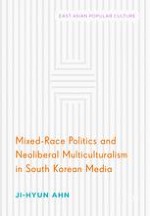2018 | OriginalPaper | Chapter
5. Televising the Making of the Neoliberal Multicultural Family
Author : Ji-Hyun Ahn
Published in: Mixed-Race Politics and Neoliberal Multiculturalism in South Korean Media
Publisher: Springer International Publishing
Activate our intelligent search to find suitable subject content or patents.
Select sections of text to find matching patents with Artificial Intelligence. powered by
Select sections of text to find additional relevant content using AI-assisted search. powered by
